Sarah Serpinas, MS, PA-C, is a Lecturer on the Didactic Faculty of the MEDEX Spokane campus. A graduate of MEDEX Spokane Class 12 (2010), Sarah joined the MEDEX Spokane faculty in 2014. In addition to her teaching duties, she is a provider at the Kaiser Permanente Riverfront Medical Center in Spokane. Sarah recently contacted MEDEX Communications with the idea of talking about her family’s experiences of homelessness while growing up, and how those experiences continue to shape her approach to work as a clinician and an educator. We gladly accepted, and what follows is a lightly edited version of that conversation.
[Editor’s Note: We are aware that the word “unhoused” is currently a preferred descriptor for being without a safe and stable place to live, but we choose to honor the language used by Sarah and by those for whom the story of unstable housing is theirs to tell.]
MEDEX Northwest: So Sarah, why don’t we start with this question: Why is it that you want to talk about this part of your past now, after having not really spoken of it much over the years? What’s motivating this discussion?
Sarah Serpinas: My hope is that the story might be inspiring to others. When you’ve had to overcome any adversity, whether it’s homelessness or anything else, things can sometimes feel overwhelming—especially something like going to PA school and becoming a provider. I know a lot of potential applicants to MEDEX follow our website and our social media, so I thought it could be inspiring to anyone with a similar background. That’s why I want to share it now. It’s not something a lot of people know about me because it doesn’t come up in conversation very often.
MEDEX: Why do you think that is? Is it a stigma?
Sarah: I think people would probably be surprised to hear it. It’s not something that I’m ashamed of, but it’s also not something that I bring up in, you know, everyday conversation. And while I do have conversations with my coworkers and my students, they’re not on the level of “tell me about your childhood,” you know? It’s just not something that typically comes up and so not a lot of people know that about me.
MEDEX: But it is a part of your personal and professional story, it sounds like.
Sarah: Oh, yeah. I mean, it doesn’t define who I am, but it has shaped me, definitely. It’s a big part of who I am. It has influenced me as a provider and as a faculty member and teacher.
MEDEX: Maybe you could start by telling us what the story is in whatever ways you want to present it. And then we can come back around and talk about how it informs your life now, personally and professionally.
Sarah: Well, when I was growing up, my family was either homeless or housing insecure from about the time I started school until about middle school. So, for most of my childhood, although I didn’t necessarily realize that we were “homeless” or “housing insecure” until I was older.
MEDEX: Because you didn’t know the difference?
Sarah: Because there’s definitely a stigma about homelessness. When we think of homelessness, we think of the people who are visible to us out on the street. We often associate it with mental illness or drug addiction. But remember that about 30% of the homeless population in the U.S. is made up of children and families—families with children.
My family, we weren’t the stereotypical “living on the street” family. We would live in a house—a rental house—for the school year. Then as soon as the school year ended, we would pack up, put our stuff in a storage unit, and we would camp. So I always just thought that we camped a lot. We would live in tents for three months of the year mostly because we couldn’t afford to continue renting, or because something happened, and we would be evicted. We’d have to leave one house for some reason, and then we would find another place to live.
And so a lot of my childhood was spent living in tents over the summer, which, again, I just associated with camping. I didn’t really realize we were homeless; we usually always had a place to live when school started again. But because of this, we moved a lot. I went to 12 or 13 different schools between kindergarten and high school.
MEDEX: Was this in the Spokane area?
Sarah: It started in Spokane, then we moved to California for about five years, and then back to Spokane. It wasn’t until I was a little older—probably fourth grade—that we lived in California, and we actually lived in a motel. It was a motel that a lot of families and kids lived in that did longer term rentals; that’s where I started realizing, “Okay, this is not normal.” I didn’t really want to go to school when I was living there because it was embarrassing. But they actually had a school in the motel for children.
So, for that year, I actually went to school in a motel room. It was for all ages. Maybe high schoolers weren’t there, but it was for all ages elementary and middle school. It was a classroom in the motel room. It still actually exists today, the Mustard Seed School.
MEDEX: Wow. And this is in California?
Sarah: Yes, in Sacramento. Even though it was a motel, they did long-term. You could rent for a month at a time. And I think that there were so many children there, they had to do something.
Then we moved back to Washington, to Colville, north of Spokane, and that was the first time that we actually lived in a homeless shelter. I was in the 7th grade. We lived in a homeless shelter for families. I’m the oldest of six children, and we had one big room with bunk beds. That’s the first time that I really realized, “Okay, like, we’re homeless.” You know? I didn’t want to tell people at school where I lived, or have people over, or anything like that.
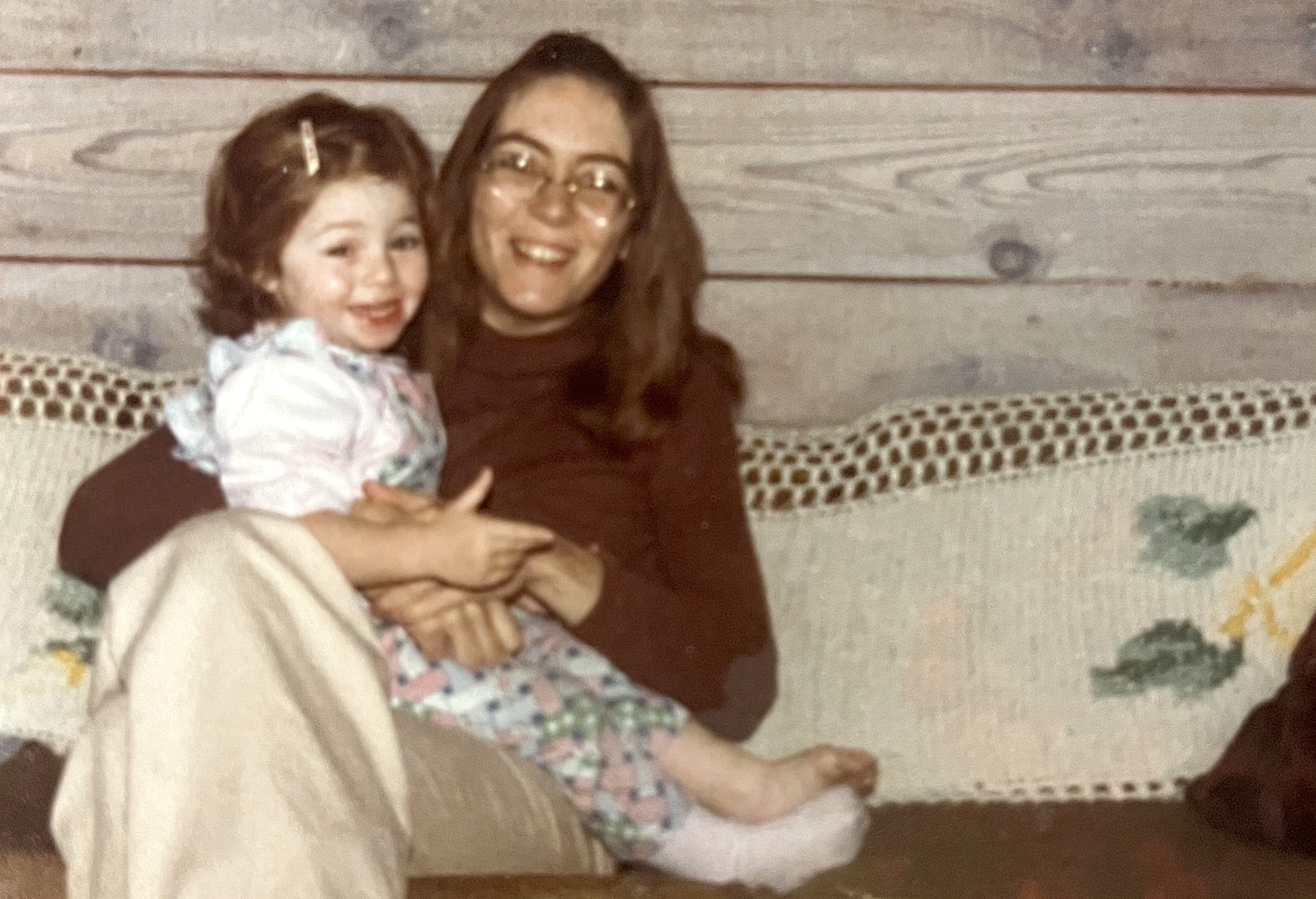
2-year-old Sarah with her mother.
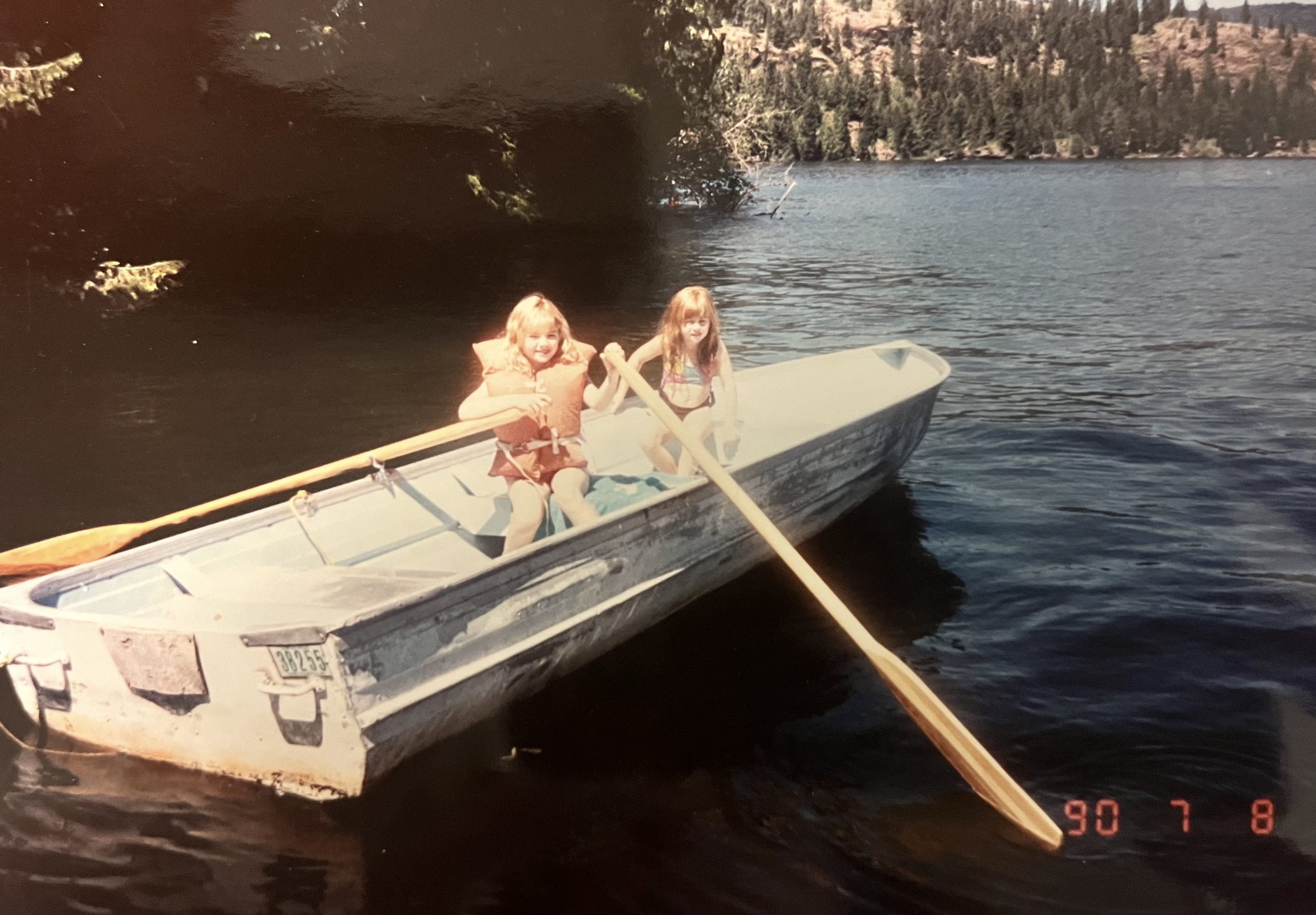
9-year-old Sarah rowing with her little sister at the lake near their grandparents cabin in Idaho.
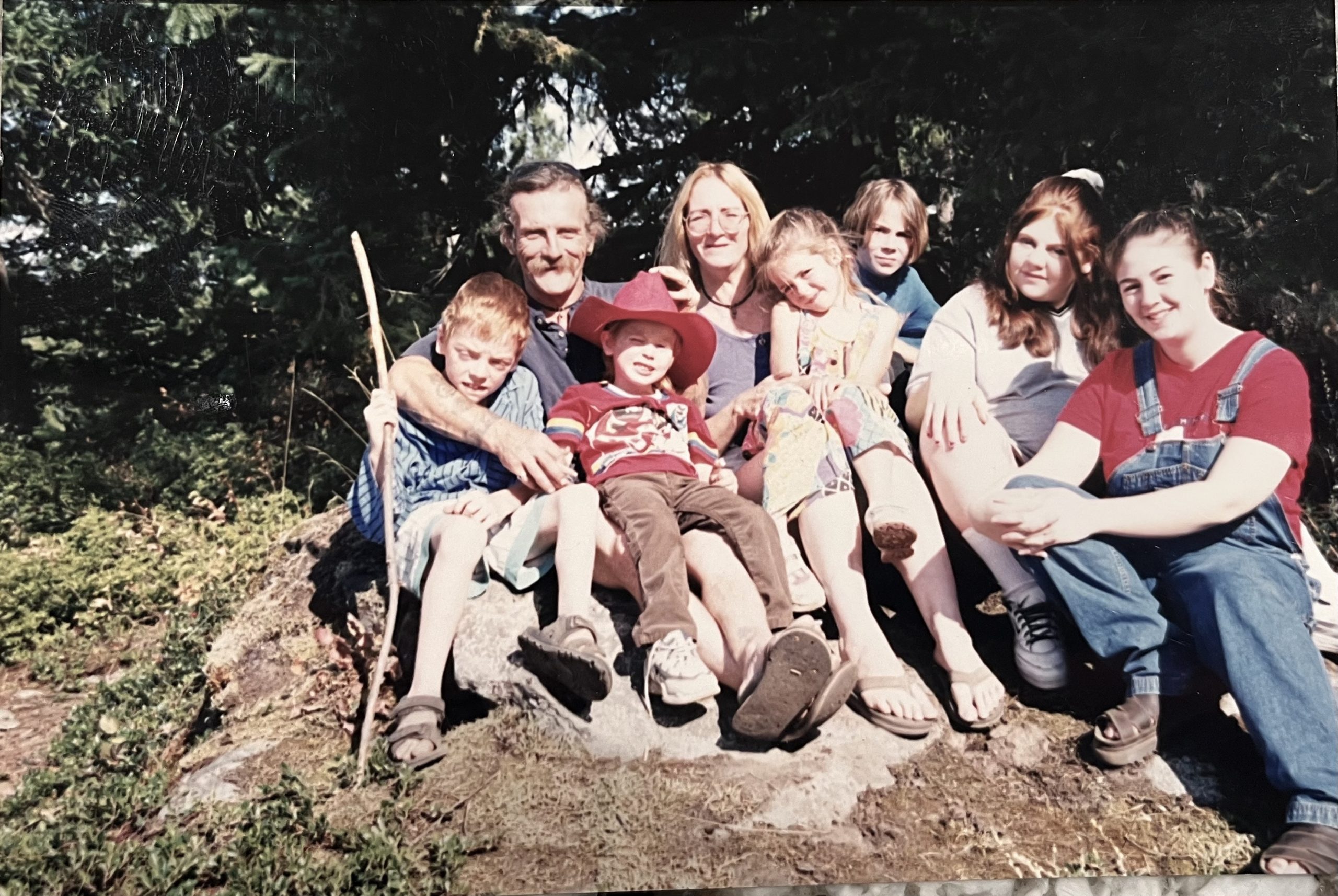
16-year-old Sarah with her family: stepdad, mom, five siblings and Sarah on the right.
MEDEX: What were the conditions that were driving these moves and these living conditions for your family? What was your family like? You said you were one of six?
Sarah: So, there was my mom and then my stepdad. It was a mixture of issues with drugs, alcohol, and just not having enough money. People can think that it’s so hard to become homeless, but I mean, missing one check can get you there, especially with six children. So often their jobs were such low income. I mean, there were a lot of factors for us, but basically, our family was my mom and my stepdad and then six kids.
MEDEX: Sounds really difficult, Sarah.
Sarah: Yeah. I think kids are very resilient, and so it doesn’t impact them as much until they start to get a bit older. But it definitely impacted my education, because I never went to one school for a long time. And going to school somewhere like a motel room that was turned into a classroom, I mean, it was great, but I wasn’t getting the same education that I would likely would have gotten somewhere else.
MEDEX: So it sounds like you began to realize the gravity of your situation as you grew older. As that started to happen, did you and your five siblings ever have conversations about things, about your situation?
Sarah: Not really. It just seemed very normal to us, I suppose. We didn’t really know anything different. There’s also a big age gap. I’m the oldest and I have a sister who’s just a year and a half younger than me, then the other four kids are quite a bit younger. By the time they got older, the family had become more stable, and then the next year, they got a rental house. From that time on, they’ve been stable, so we didn’t really have a lot of those conversations because things stabilized.
So, about the time that we moved from Colville, when we were in a homeless shelter, we moved back to Spokane, where were living again in a motel. At that time, because I’m older at this point, I said, “I can’t do this. I can’t live in a motel. I can’t go to school like this.” I had grandparents in Spokane, and so I asked to move in with them. I lived with my grandparents for a year, moved back in with my parents for a year, and then ended up moving back into my grandparents’ house for most of high school because it was stable.
And at that point, I had made the decision that I need to focus on school. I was always a pretty good student, but I could have been so much better. I mean, I was a pretty good student for the situation, but I knew I needed to get something together if I was going to do anything after high school.
MEDEX: You could say that about everything you did as a young person, couldn’t you? That you were “X” because of your situation. Do you see your situation at the time as informing most everything in your life that way?
Sarah: Oh, yeah, for sure.
MEDEX: What about your family and healthcare?
Sarah: My parents either didn’t work most of my life, or they worked very short-term jobs. We always had healthcare because we had some type of state insurance. But I don’t remember going to see a provider very often as a child. I know we got our immunizations that we needed for school, but I didn’t have a lot of experience seeing a healthcare provider until I was quite a bit older. Plus, we never had one provider that was our family provider, because we moved so often. It was more about going into an urgent care if you were ill.
MEDEX: So it sounds like there was a period of transition in high school as you moved in with your grandparents when you began to get a sense of yourself as a student. When did you start to think of yourself as a member of the profession you’ve ended up in? When did you begin to imagine yourself as a healthcare professional?
Sarah: That was kind of accidental. Moving in with my grandparents, I got good grades, but I wasn’t the best student. For two years of high school, I went to an alternative school here in Spokane. Then my grandparents insisted that I return to the regular neighborhood high school that I should be graduating from. So I went back to that high school to graduate.
But I had no idea what I wanted to do in high school. Nobody in my family had gone to college, and nobody talked to me about going to college. It seemed overwhelming; going to a to a four-year college wasn’t an option, because I hadn’t taken the correct classes in high school to go to a four-year college. But I also knew that I wanted to change my situation, and that I did not want to live the same life that I had been living.
So right out of high school, I went to community college in Spokane. I figured out how to do all that by myself. I went to school to become a teacher because I wasn’t really sure what I wanted to do. I had always loved school. School was like a safe place, you know? There’s food, it’s warm, teachers are nice to you. They understand what’s going on. They can tell. So, I thought, “I’ll be a teacher.”
And then I got pregnant, at 18, my first year of community college. And that kind of changed my plans. I decided I needed to do something quick so that I could get a job and make some money. I opened the catalog and medical assisting was an option. It was a two-year program, and it looked like they had good job placement. So that’s how I got into medicine.
At that point, I didn’t have much experience seeing providers. Nobody in my family was in medicine at all. So I became a medical assistant, and that’s what led me towards becoming a PA. But up to that point, I didn’t know I wanted to do medicine; I just needed a job—one that I could get quickly.
I didn’t have a lot of people around me talking about that pull toward medicine that they felt, or that they always knew they wanted to be in medicine. It wasn’t until I became a medical assistant that I realized I actually liked medicine and that I wanted to do it. I fell in love with medicine.
After two or three years as an MA, I realized I wanted to do something more, but becoming a provider still seemed completely overwhelming. “I’m not smart enough to become a provider,” I thought. “People like me don’t become providers.” And up to that point, all of the providers that I had ever met were a lot older. It just seemed unattainable.
So, I thought I would go to nursing school as my next step, which is the progression for a lot of medical assistants, and that’s what I began working on while I was working as an MA. I had my son and then I took classes to finish the prerequisites to apply to nursing school. I knew at this point that I wanted to stay in medicine, but being a provider just did not seem realistic for me.
I worked at Group Health at the time, which employed a lot of PAs. A lot of them were MEDEX graduates. They hired a new PA who was younger—he was in his thirties—and he’s the one that finally inspired me to think, “Hey, you can go to PA school. You’re smart enough to do this. You’re already doing the prerequisites. You need to apply to PA school.”
I started shadowing with PAs who were MEDEX graduates. MEDEX was really my only option. It’s the only school I applied to, mostly because it was in Spokane; I could not have left Spokane. I [also] did not have a bachelor’s degree, and at the time, MEDEX was still accepting students without a bachelor’s degree. So, I started shadowing and started, you know, looking into it.
And I started getting encouragement from the PAs that I worked with. Once they know what you’re interested in, PAs are so good about taking you under their wing. They all inspired me to do it. I just kept working away at my prerequisites thinking, “Well, if I don’t get in, I can always apply to nursing school.”
And then I applied. I didn’t get in my first year. I reapplied the next year and got in, and here I am.
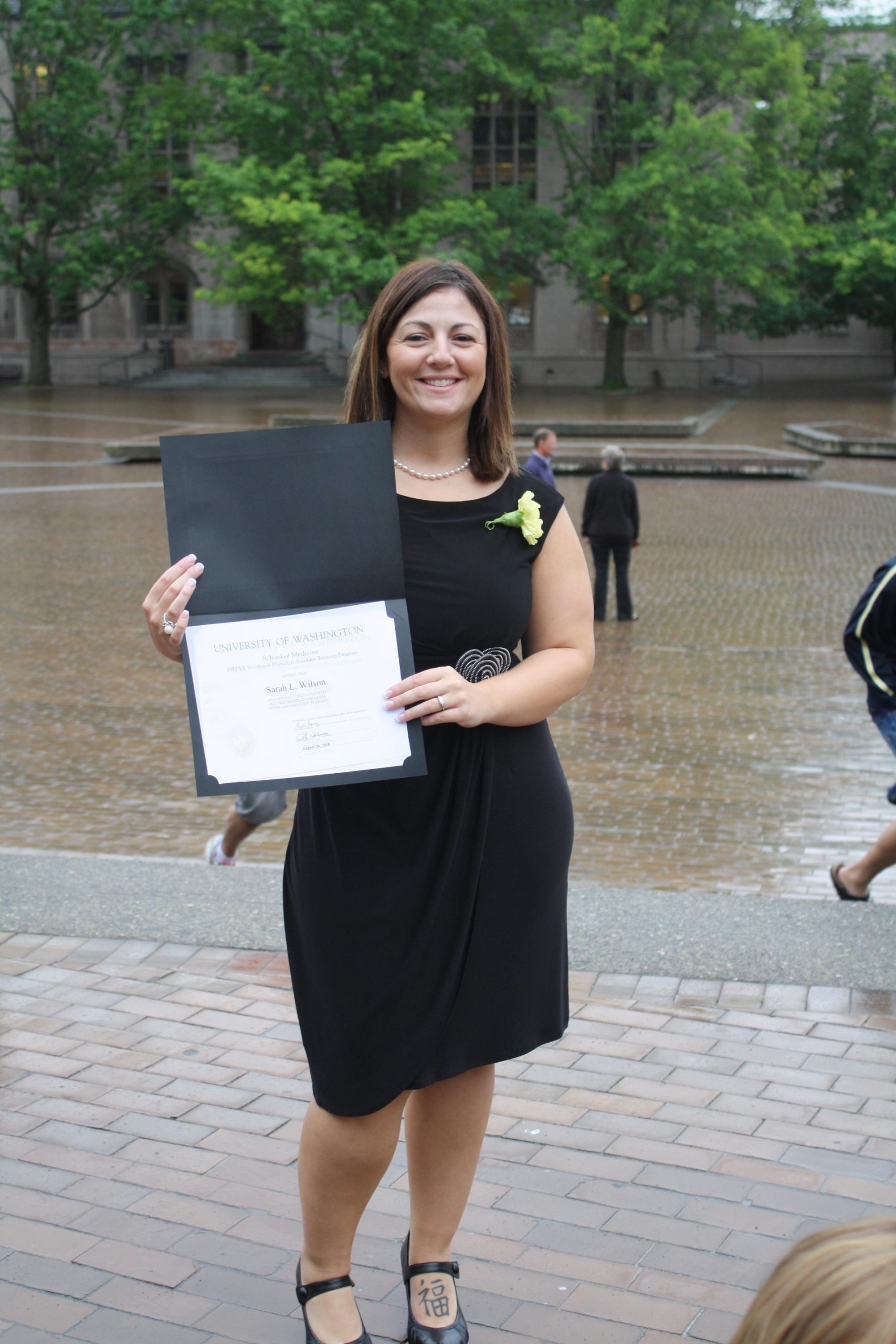
Newly minted MEDEX Spokane Class 12 (2010) graduate Sarah Serpinas on the University of Washington’s Seattle campus.
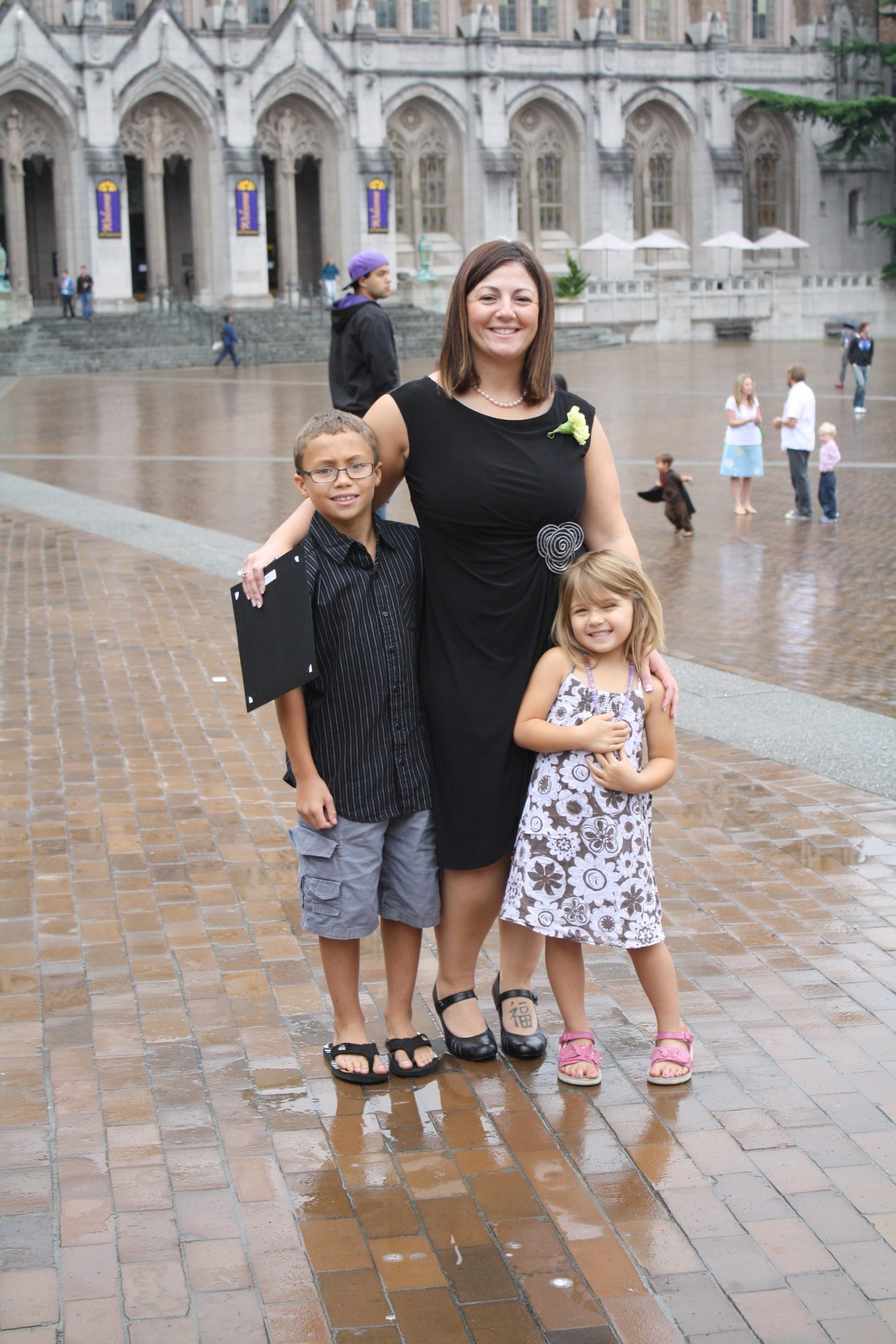
MEDEX Spokane Class 12 (2010) graduate Sarah Serpinas with her son Andreas and daughter Mya.
MEDEX: What was the MEDEX interview process like for you?
Sarah: It was a struggle at the interviews, and throughout PA school, really. I was sure that they were going to find out that I shouldn’t be there, that they shouldn’t have let me in, that I’m not smart enough to do this. I mean, that was a struggle for sure, but that’s a struggle for a lot of people.
MEDEX: And do you think now that having experienced homelessness growing up was informing the imposter phenomenon you were experiencing?
Sarah: I don’t even know if it was just the homelessness. I think it was the entire way that I was raised. I never felt smart enough. Other people around me just seemed more polished, I guess. I was rougher around the edges. Part of it was not getting the best education growing up, and homelessness definitely contributed to that.
MEDEX: This is hindsight speaking, yes? Or did you think this at the moment?
Sarah: No, I don’t think it was a conscious thing then. I think it was because nobody else in my family had gone to college. My parents had never really held a steady job at all, let alone anything in medicine, so I don’t think it was necessarily just the homelessness part of it; it was more that I hadn’t known anybody personally who had ever done anything like this.
MEDEX: You speak about how everybody around you seemed so polished and that you were rough around the edges. This must have made you feel the need to prove yourself, or do that extra bit in school because of your background?
Sarah: Yes, for sure. I mean, I think I still am doing that. Once I got into PA school, my grades were great; I was a great student, I studied hard. Everybody studies hard, of course, but I definitely felt that I especially had to prove myself. And again, I think that that remains true, even now.
I also feel that my upbringing has been a huge part of why I have never pursued leadership positions in my work, even when they have been offered. I am finally comfortable in my role as a provider and a faculty member, but the thought of moving into a leadership position is still very intimidating, and I think this is directly related to my upbringing.
MEDEX: And what should people take from your story, particularly those who have experienced homelessness themselves and might struggle with the kind of imposter versus success thing, the polished versus rough edges story that you describe?
Sarah: Well, I mean, it’s hard. It’s something that I have mostly kept secret. For reasons we talked about, I did keep it secret as a child. But as an adult, well, I haven’t necessarily meant to or tried to keep it secret.
MEDEX: It never came up in the interview process, for instance?
Sarah: No. And I probably wouldn’t have said much of anything about it if it had come up.
MEDEX: And why is that?
Sarah: Oh, I think I would have been afraid that it would have negatively impacted me. But now, looking back and having worked at MEDEX and gone through admissions, I know that that’s not true. But at the time, no, I don’t think I would have brought it up. I also probably would have been embarrassed because we’re in a group interview; I would have been embarrassed in front of my fellow applicants to talk about it, so no, it never came up.
MEDEX: What about during your years as a MEDEX student?
Sarah: It didn’t really come up when I was a student either. It was something that I was keeping secret. Now I’m older and more experienced, and I don’t really care that people know.
MEDEX: So you seem to be saying that your experience of homelessness has influenced many things in your life, but that it’s hard to put a finger on just exactly how it’s influenced things, yes?
Sarah: Yes, right.
MEDEX: How about specifically with your interests and emphases as a provider? Can you see that it’s shaped your work in certain ways?
Sarah: Yeah, I definitely can see it there. I feel like growing up with my background and more difficult childhood has given me a unique ability to connect with patients who are also from marginalized backgrounds, who have also dealt with adversity, difficult childhoods, difficult experiences. I feel like I connect with those patients more than somebody who has not experienced those things might. I feel like I’m more empathetic. I feel like things don’t shock me or surprise me when patients tell me certain things, and I think that I do a good job of talking to patients like they’re just regular people.
Not that you have to experience these exact sorts of things to be empathetic and to connect with patients, but until you’ve experienced things yourself, it can be hard to put yourself in someone else’s shoes. So, I definitely think that it’s made me a better provider.
MEDEX: So if I’m your patient and I’ve experienced things similar to what you did as a child, that I’ll sort of sense that in you, and I’ll be more likely to share things with you as a result?
Sarah: I don’t know that you’ll sense it in me, but I do think that you’ll know I’m not talking down to you, that I’m not talking to you strictly as the provider and the patient. I think that’s what people sense, and they feel like they can share with me because of that, but I don’t necessarily know if they identify that we have a shared experience.
I do have a soft spot for patients who come from those marginalized backgrounds, who are often not heard and not seen and have had bad experiences in healthcare, including homeless patients. I have seen homeless patients not being treated well because there is that stigma, or that providers are burnt out; there’s a lot of reasons. But, yeah, I definitely feel like I just connect better.
MEDEX: I’m sure you do. I can feel it as you say it.
Sarah: You know TJ Byrne, right?
MEDEX: Yes, I was just going to ask about TJ, whether you have worked with him.
Sarah: TJ Byrne was full-time MEDEX Spokane faculty when I was a student. He was brand new, and he was awesome. At that time, he wasn’t doing homeless healthcare—he was working in the ER. But he was amazing, and he’s been like a mentor to me since I was a PA student. He got very involved in homeless healthcare and street medicine. I believe he may be retired now, but that’s what he did for a number of years
MEDEX: Yes, we had the pleasure of hanging out with TJ and a MEDEX Spokane student on his clinical rotations and publishing a feature piece and video on him and his work in MEDEX Magazine. Great guy, great work he was doing. You must have learned so much from him.
Sarah: I was able to go out with him as a volunteer during COVID, and it was one of the best things I’ve done; out into the streets and into homeless shelters. I only did a handful of shifts with him, but it was awesome. We’ve had conversations about some of these things, and TJ knows a little bit about my story.
MEDEX: We can think of “homeless medicine” or “street medicine” as umbrella terms for a certain kind of care. But one can conduct “homeless medicine,” for instance, without actually being out on the streets with TJ, right? Isn’t that kind of what you, Sarah, are providing as an empathetic provider around this issue, no matter where you are meeting your patients?
Sarah: Yes. You can provide healthcare to homeless patients in any setting, and oftentimes you may not even know they’re homeless. It’s not just the person coming in off the street to the urgent care, which is where I do take care of homeless patients of course, but you may also be seeing school children in your clinic and not even realize that they’re homeless. So you’re providing “homeless healthcare” in any setting, really, to patients who have been or are currently homeless.
I think “street medicine” is different because street medicine is taking that healthcare and that medicine right to them. It’s what TJ was doing in the mobile clinic—pulling up at food banks and places in the community where people in need of healthcare are gathered.
MEDEX: And it’s fair to say that “homeless healthcare” is not a marginalized form of healthcare, not anymore. Not at this moment, not in our culture or our society now, with such high levels of displacement, so many people at risk, only one check away, as you put it earlier.
Sarah: Right, it doesn’t take a whole lot to get there, especially for a family. You lose a job, you miss one check, and you can’t make rent. There’s chronic homelessness; there’s intermittent homelessness; there’s hidden homelessness with people living on couches. And then there’s the housing-insecure where you have a place, but you know that you’re one check away from losing it. Or you’re living in substandard housing. So, I mean, we’re all taking care of patients from one of those types of backgrounds. I don’t consider myself a homeless healthcare provider, but I provide care to patients from those backgrounds.
MEDEX: Or we could say that you’re not a homeless healthcare provider, but rather a healthcare provider who was homeless.
Sarah: Yes. Which again is why I think that I can connect with people in a unique way, because I imagine that not a lot of the providers I work with have that same background. Maybe some do, but probably not a whole lot.
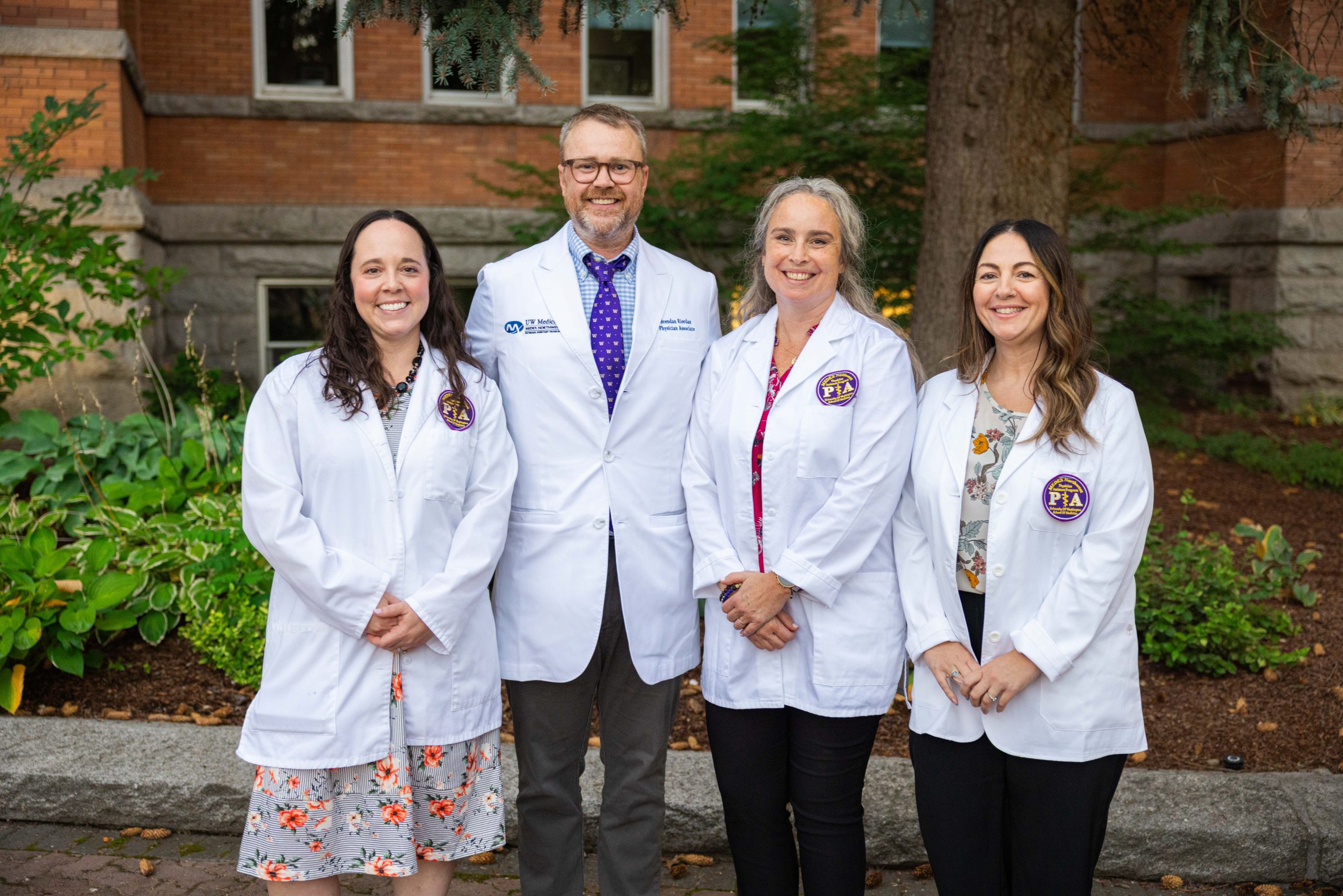
MEDEX Spokane faculty (L to R) Stacey Whitaker, DMSc, MMS, PA-C, CAQ-PSYCH; Brendan Riordan, MS, PA-C; Cari Rodgers, MSPAS, BCHS, PA-C; and Sarah Serpinas, MS, PA-C — Gonzaga University campus, Spring 2023.
MEDEX: Following on all that you have shared with us, let’s come back around to what the value of telling your story is to you personally, or to your practice, or to your students?
Sarah: Look, I want people out there who might be thinking about this to know that they can do this. It’s possible. You can overcome adversity. I think we look at providers or PA faculty and we have certain ideas about them, and I just want people to know that, well, we all come from different backgrounds. Not all your PA faculty grew up with a parent who was a doctor or with two parents that went to college.
I’m guessing that’s what a lot of people probably assume because, like I said, it was not realistic for me to even go to college. I would have never thought I would be a University of Washington student or a provider or a faculty member. I want for people to realize that we have many different backgrounds. I want to maybe inspire somebody who’s questioning whether or not they can do this to think yes, yes you can. If you want to do this, you can do this, no matter what your background is.
MEDEX: It’s very inspiring.
Sarah: That’s my hope. I don’t mind people knowing now, but I’ve worried a little bit about oversharing, you know, or making the story too personal. But if it can inspire anybody, I mean, I think it’s worth telling.
MEDEX: Yes, symptoms of stigma can only be challenged by talking about it and normalizing it, right?
Sarah: Yes.
MEDEX: Speaking as a healthcare professional and educator, do you think that we’re on the path to eradicating that stigma? How much work is there still to be done?
Sarah: I think there’s a lot more work to be done. I think that the stigma around homelessness is still huge. I mean, if we say homelessness, I know what comes to most people’s minds, and so that’s why I think it’s important to share our stories. It does not have to define you.
MEDEX: Do you want your students to be part of that opening up and sharing in the same manner that you want your patients to be? Or are those different things?
Sarah: The most important thing with my students is just to make sure that they turn out to be empathetic providers, and that they are comfortable taking care of patients from different backgrounds. That’s very important for me to work on with my students. But, yeah, I think students should be sharing—sharing their stories—so that people can see the struggles that they have overcome to get here. Some people are embarrassed, some people are ashamed, but it’s something to be proud of—proud of getting through it, surviving.

